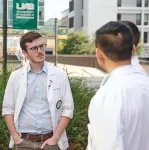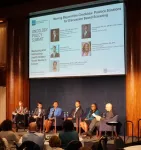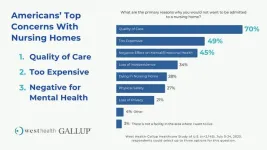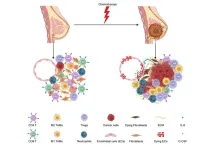(Press-News.org) An article published in NPJ Aging, a Springer Nature journal, reveals that natural production of auto-antibodies increases with age and that infection by SARS-CoV-2 can exacerbate production of auto-antibodies relating to auto-immune diseases, helping to explain why aging increases the chances of developing severe COVID-19. The study also discovered some of the factors that associate the severe form of the disease with blood clotting disorders such as thrombosis.
“These findings open the door to a better understanding of many pathological events associated with COVID-19, ranging from memory loss to sudden death from acute thrombosis. The hyperinflammation typical of severe COVID-19 and the increase in auto-antibodies produce blood clotting, resulting in the need to reconstruct tissue and recruit a coagulation cascade. Thrombosis and inflammation are closely correlated. Our study is one more confirmation of this important link,” Otávio Cabral-Marques, a professor at the University of São Paulo’s Medical School (FM-USP) in Brazil and last author of the article, told Agência FAPESP.
The study was supported by FAPESP (projects 18/18886-9, 20/01688-0, 20/07069-0, 20/16246-2 and 20/09146-1). Researchers in Germany and the United States collaborated.
Another interesting aspect of the study, according to Cabral-Marques, is that the rise in levels of auto-antibodies – antibodies (immune proteins) that may harmfully react with a person’s own tissues or organs – in severe COVID-19 cases could also be true of other pathologies.
“It’s not exclusive to SARS-CoV-2. Other pathogens also raise levels of auto-antibodies, so that they can serve as markers or therapeutic targets to save the lives of patients with almost terminal sepsis, for example,” Cabral-Marques said.
The study involved an analysis of auto-antibody data for 159 COVID-19 patients (71 mild, 61 moderate, and 27 severe) and 72 healthy individuals as the control group. “When we cross-referenced the data using artificial intelligence techniques, we discovered two main auto-antibodies that were exacerbated in patients with severe symptoms. They were precisely the auto-antibodies associated with blood clotting and thrombocytopenia [low blood platelet count, heightening the risk of hemorrhage],” said Dennyson Leandro M. Fonseca, first author of the article.
High levels of these auto-antibodies, he explained, can lead the organism to harm itself by producing blood clots and netosis – an immune system mechanism involving regulated cell death via the formation of neutrophil extracellular traps (NETs), networks of DNA that bind to pathogenic microbes. In certain cases, NETs serve as markers of alveolar inflammation and may contribute to tissue injury.
“When we divided the data into younger and older patients, we found that although this mechanism may occur in under-50s, it makes the elderly more susceptible to severe COVID-19. This explains why old age is one of the main risk factors for COVID-19,” he said.
As noted, a mild increase in production of auto-antibodies is part of the natural aging process, but the researchers observed that infection by SARS-CoV-2 exacerbates levels of auto-antibodies in severe patients.
Previous studies showed that auto-antibodies targeting proteins in the first line of anti-viral defense (interferons) are present in the general population and increase dramatically in older COVID-19 patients. The study reported in NPJ Aging extends the classes of auto-antibodies associated with aging and confirms that their impact varies according to age and COVID-19 severity.
The group discovered that severe COVID-19 patients display a significant age-related increase in auto-antibodies against 16 targets, including amyloid β peptide, β catenin, cardiolipin, claudin, enteric nerve, fibulin, insulin receptor A and platelet glycoprotein.
“This discovery provides new avenues for validation of the action mechanism of auto-antibodies and broadens the pool of targets, providing a more comprehensive picture of the underlying pathophysiology of COVID-19 disease progression with the advance of aging and permitting more suitable interventions,” Cabral-Marques said.
Systemic problem
Severe COVID-19 is known to cause profound organ damage due to a combination of auto-inflammatory and auto-immune responses. This process can result in myopathy (muscle disorders), vasculitis (blood vessel inflammation), arthritis (joint inflammation), anti-phospholipid syndrome (APS) associated with deep vein thrombosis, pulmonary embolism and stroke, as well as other damage to lungs, kidneys and the neurological system.
Immunological dysregulation is also frequent in post-COVID syndrome, causing heterogeneous symptoms such as fatigue, vascular dysfunction, pain, neurological manifestations and neuropsychiatric problems.
The most well-known inflammatory response associated with COVID-19 is the “cytokine storm”, which basically consists of heightened release of cytokines (the molecules responsible for alerting the immune system to the need to send more defense cells to the infection site), leading to exacerbated inflammation and dysregulation of other signaling systems. Another is hyperactivation of macrophages, immune system cells that promote auto-antibody production.
Which comes first?
The authors of the article are not yet sure which comes first – the severity of COVID-19 or the rise in levels of auto-antibodies. “We analyzed these two directions statistically and believe they’re both mutual and bidirectional,” Fonseca said. “Auto-antibodies may interact, in conjunction with other immune system molecules, in a highly complex network that underlies immunopathological processes in severe COVID-19, or they may be boosted by health problems associated with aging and make the disease progress to a severe condition.”
Severe COVID-19, he noted, promotes an environment in the organism involving tissue injury (acute respiratory distress syndrome), cytokine storm and macrophage hyperactivation, all of which fosters the production of auto-antibodies. In turn, this context could allow auto-antibodies to act synergistically with multiple metabolites, cytokines and chemokines, which are naturally dysregulated in elderly patients as part of immunosenescence, resulting in increased susceptibility to infections and auto-immune disorders.
About São Paulo Research Foundation (FAPESP)
The São Paulo Research Foundation (FAPESP) is a public institution with the mission of supporting scientific research in all fields of knowledge by awarding scholarships, fellowships and grants to investigators linked with higher education and research institutions in the State of São Paulo, Brazil. FAPESP is aware that the very best research can only be done by working with the best researchers internationally. Therefore, it has established partnerships with funding agencies, higher education, private companies, and research organizations in other countries known for the quality of their research and has been encouraging scientists funded by its grants to further develop their international collaboration. You can learn more about FAPESP at www.fapesp.br/en and visit FAPESP news agency at www.agencia.fapesp.br/en to keep updated with the latest scientific breakthroughs FAPESP helps achieve through its many programs, awards and research centers. You may also subscribe to FAPESP news agency at http://agencia.fapesp.br/subscribe.
END
COVID-19 can trigger auto-immune disorders-related antibodies, causing thrombosis and other complications
A study conducted at the University of São Paulo helps explain why older people are more susceptible to the severe form of the disease and why it involves blood clotting disorders
2023-09-12
ELSE PRESS RELEASES FROM THIS DATE:
Alzheimer’s: An M.D./Ph.D. graduate student’s request for Yuhua Song as mentor leads to two NIH R01 awards totaling $5 million
2023-09-12
BIRMINGHAM, Ala. – In the summer of 2018, graduate student Hunter Dean from the Medical Scientist Training Program came to Yuhua Song, Ph.D., with a research idea. He wanted to pursue his doctoral research at the University of Alabama at Birmingham in Alzheimer’s disease — under the joint mentorship of Song, who had never worked in Alzheimer’s, and Erik Roberson, M.D., Ph.D., an Alzheimer’s expert in the UAB Department of Neurology and the Center for Neurodegeneration and Experimental Therapeutics, or CNET.
That collaboration brought Song, a professor in the UAB Department of ...
Recommendations for addressing health-related social needs in cancer care introduced at NCCN Policy Summit
2023-09-12
Today, the National Comprehensive Cancer Network® (NCCN®)—an alliance of leading cancer centers—presented new recommendations for screening and addressing health-related social needs (HRSN) in people with cancer during a policy summit in Washington, D.C. The event included a keynote address from Ellen Lukens, Deputy Administrator and Director, The Center for Medicare and Medicaid Innovation (CMMI), and other speakers representing a diverse group of patient advocates, providers, and policymakers.
The new recommendations for measuring and addressing HRSNs were ...
West Health-Gallup Poll: 70% of Americans uncomfortable with prospect of being admitted to nursing home
2023-09-12
WASHINGTON, D.C. — September 12, 2023 — More than 40% of Americans say nursing homes are unsafe and 7 in 10 say they would be uncomfortable ever having to be admitted to one even if they needed such care, while more than six in 10 (61%) feel similarly anxious about the prospect of admitting family members, according to the latest survey from West Health and Gallup.
Safety was a particular area of perceived concern; 41% of respondents say nursing homes are not safe, 26% say they are, and about a third say they don’t know. Notably, the survey found that people over 35 were much ...
UTHealth Houston researcher to present abstract detailing new mouse model for brain arteriovenous malformations at NIH meeting
2023-09-12
An abstract unveiling a new mouse model for brain arteriovenous malformations (AVMs) developed by UTHealth Houston researchers has been selected for a poster presentation at the second annual National Institutes of Health (NIH) Investigator Meeting for Interoception Research in November.
Eunsu Park, PhD, assistant professor in the Vivian L. Smith Department of Neurosurgery with McGovern Medical School at UTHealth Houston, will present the abstract at the meeting, hosted by the National Center for Complementary and Integrative Health (NCCIH) at the NIH campus in Bethesda, Maryland, on Nov. ...
Combination of stressors key to testing perovskite solar cells
2023-09-12
Perovskite solar cells should be subjected to a combination of stress tests simultaneously to best predict how they will function outdoors, according to researchers at the U.S. Department of Energy’s National Renewable Energy Laboratory (NREL).
Solar cells must endure a set of harsh conditions—often with variable combinations of changing stress factors—to judge their stability, but most researchers conduct these tests indoors with a few fixed stressing conditions. While these tests provide some necessary insight, understanding which stressor applied during indoor tests provided predictive correlations ...
Communicating stability, strong connections to stakeholders versus shareholders are priorities in Chinese financial reporting, Rotman research finds
2023-09-12
September 12, 2023 Toronto - It’s commonly accepted that U.S. and Chinese companies treat financial reporting and disclosure differently.
New research not only confirms that but digs into the motivations behind the distinction, using surveys with more than 200 Chinese executives who hold reporting responsibility. An overriding interest in communicating long-term stability and inspiring confidence in the company’s prospects among a diverse range of stakeholders, and not primarily shareholders, as in the U.S., was a signature driver for the Chinese business leaders.
“Acknowledging differences in approaches and incentives ...
Morris Animal Foundation funds 6 new studies to advance canine cancer research
2023-09-12
DENVER/Sept. 12, 2023 – Recent findings from the Golden Retriever Lifetime Study confirm the enormous impact of hemangiosarcoma on golden retrievers. To address critical gaps in disease detection and treatment, Morris Animal Foundation announced it is funding six studies focused on this deadly form of canine cancer.
“We are committed to providing resources to the top research teams in the world that can advance our understanding of hemangiosarcoma," said Dr. Kathy Tietje, Chief Program Officer at Morris Animal Foundation. "These innovative research ...
ReMDO grants support commercialization of regenerative medicine therapies
2023-09-12
WINSTON-SALEM, NC, September 12, 2023 - When the RegenMed Development Organization (ReMDO) offered its grant opportunity related to regenerative medicine manufacturing and commercialization, the result exceeded expectations.
The Regenerative Medicine Manufacturing grant call encouraged small, medium, and large companies to submit letters of interest with an accompanying white paper that addressed a gap in technical capabilities for one or more of the following topic areas: Cell and Biomaterial Manufacturing, Standards and Quality Control, Additive Manufacturing and Artificial Intelligence (AI) and Automation.
The grant opportunity will ...
Breast cancer recurrence may be triggered by chemotherapy injury to non-cancer cells
2023-09-12
A standard chemotherapy drug injures surrounding non-cancer cells, which can then awakens dormant cancer cells and promotes cancer growth, according to a new study publishing September 12th in the open access journal PLOS Biology by Ramya Ganesan of Emory University, US, and colleagues. The finding is important for understanding cancer recurrence and may point to important new targets to prevent it.
Advances in cancer treatment, including chemotherapy, have dramatically reduced mortality for many types of cancer, including breast cancer. Nonetheless, up to 23% of breast cancer patients experience recurrence within the first five years. Treatment is meant to kill all cancer cells, ...
Disease-resistant rice and wheat plants may modulate disease susceptibility in their neighbors
2023-09-12
Growing several plant varieties in the same field for disease resistance is a longstanding agricultural practice, but can have unpredictable results. A study publishing September 12th in the open access journal PLOS Biology by Jean-Benoit Morel at Institut National de Recherche pour l'Agriculture l'Alimentation et l'Environnement, Montpellier, France, and colleagues suggests that plant-to-plant interactions may confer disease immunity in both wheat and rice.
Neighbor-Modulated Susceptibility (NMS) occurs when healthy, same-species ...
LAST 30 PRESS RELEASES:
Tiny flows, big insights: microfluidics system boosts super-resolution microscopy
Pennington Biomedical researcher publishes editorial in leading American Heart Association journal
New tool reveals the secrets of HIV-infected cells
HMH scientists calculate breathing-brain wave rhythms in deepest sleep
Electron microscopy shows ‘mouse bite’ defects in semiconductors
Ochsner Children's CEO joins Make-A-Wish Board
Research spotlight: Exploring the neural basis of visual imagination
Wildlife imaging shows that AI models aren’t as smart as we think
Prolonged drought linked to instability in key nitrogen-cycling microbes in Connecticut salt marsh
Self-cleaning fuel cells? Researchers reveal steam-powered fix for ‘sulfur poisoning’
Bacteria found in mouth and gut may help protect against severe peanut allergic reactions
Ultra-processed foods in preschool years associated with behavioural difficulties in childhood
A fanged frog long thought to be one species is revealing itself to be several
Weill Cornell Medicine selected for Prostate Cancer Foundation Challenge Award
Largest high-precision 3D facial database built in China, enabling more lifelike digital humans
SwRI upgrades facilities to expand subsurface safety valve testing to new application
Iron deficiency blocks the growth of young pancreatic cells
Selective forest thinning in the eastern Cascades supports both snowpack and wildfire resilience
A sea of light: HETDEX astronomers reveal hidden structures in the young universe
Some young gamers may be at higher risk of mental health problems, but family and school support can help
Reduce rust by dumping your wok twice, and other kitchen tips
High-fat diet accelerates breast cancer tumor growth and invasion
Leveraging AI models, neuroscientists parse canary songs to better understand human speech
Ultraprocessed food consumption and behavioral outcomes in Canadian children
The ISSCR honors Dr. Kyle M. Loh with the 2026 Early Career Impact Award for Transformative Advances in Stem Cell Biology
The ISSCR honors Alexander Meissner with the 2026 ISSCR Momentum Award for exceptional work in developmental and stem cell epigenetics
The ISSCR honors stem cell COREdinates and CorEUstem with the 2026 ISSCR Public Service Award
Minimally invasive procedure effectively treats small kidney cancers
SwRI earns CMMC Level 2 cybersecurity certification
Doctors and nurses believe their own substance use affects patients
[Press-News.org] COVID-19 can trigger auto-immune disorders-related antibodies, causing thrombosis and other complicationsA study conducted at the University of São Paulo helps explain why older people are more susceptible to the severe form of the disease and why it involves blood clotting disorders




